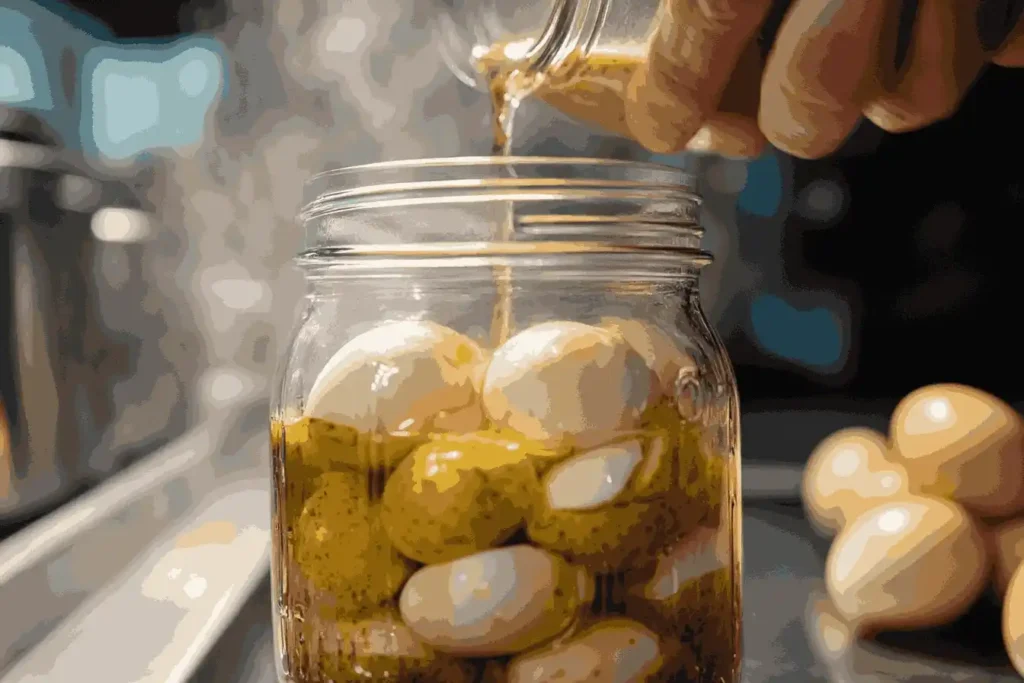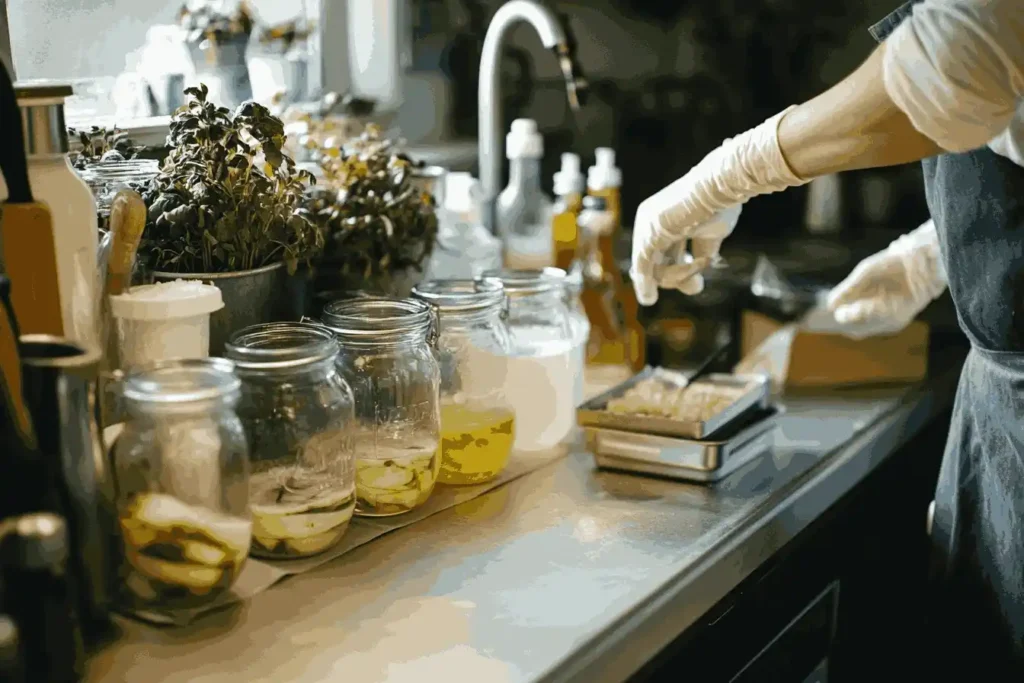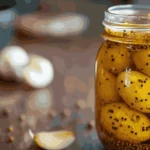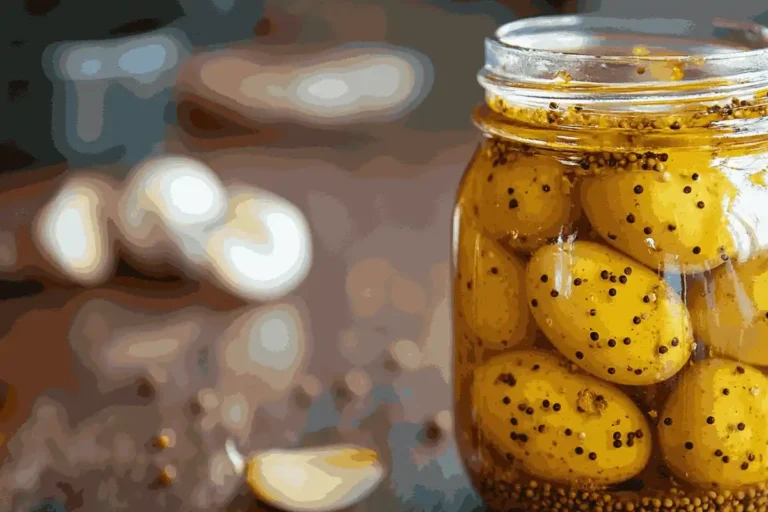Mustard pickled eggs are a bold and flavorful twist on traditional pickled eggs, combining the tangy sharpness of vinegar with the zesty kick of mustard. A staple in bars, delis, and home kitchens, these eggs are easy to make and offer a unique balance of acidity, spice, and rich texture. Whether enjoyed as a snack, part of a charcuterie board, or a protein-packed addition to salads and sandwiches, mustard pickled eggs are both delicious and versatile. In this guide, we’ll walk you through the process of making them, the best storage methods, creative serving ideas, and essential food safety tips to ensure a perfect batch every time.
Table of contents
- Introduction to Mustard Pickled Eggs
- Ingredients and Equipment Needed
- Step-by-Step Recipe for Mustard Pickled Eggs
- Best Practices for Storing Mustard Pickled Eggs
- How to Enjoy Mustard Pickled Eggs
- Food Safety and Preventing Botulism
- Health Benefits and Nutritional Value
- Common Mistakes and Troubleshooting
- Frequently Asked Questions (FAQs)
- Conclusion
Introduction to Mustard Pickled Eggs
What Are Mustard Pickled Eggs?
Mustard pickled eggs are a delicious twist on traditional pickled eggs, featuring a tangy mustard-infused brine that enhances their flavor. These eggs are soaked in a vinegar-based solution with mustard, spices, and seasonings, creating a bold, zesty taste. Popular in many regions, they are often enjoyed as a snack, appetizer, or a unique addition to salads and platters.
The History and Popularity of Pickled Eggs
Pickled eggs date back centuries, originating as a method to preserve eggs before refrigeration was common. Traditionally found in taverns, bars, and farmhouses, pickled eggs have been a favorite snack across Europe and North America. Over time, different variations emerged, including mustard pickled eggs, which add a rich, spicy dimension to the classic recipe.
Why Mustard Pickled Eggs Are a Unique Twist
What sets Spicy mustard brined eggs apart is the balance of tanginess and mild heat. The mustard not only provides depth of flavor but also enhances the preservation process. Whether using yellow mustard, Dijon, or whole-grain mustard, each type adds a distinct character to the brine, making these eggs stand out from traditional vinegar-pickled eggs.
Ingredients and Equipment Needed
Essential Ingredients for Mustard Pickled Eggs
To make mustard pickled eggs, you’ll need:
- Eggs – Preferably large, fresh eggs
- Vinegar – White vinegar or apple cider vinegar for acidity
- Mustard – Yellow mustard, Dijon, or whole-grain mustard
- Sugar – Balances the acidity and adds a slight sweetness
- Salt – Enhances flavor and aids preservation
- Spices – Common choices include turmeric, black pepper, mustard seeds, and garlic
- Water – To adjust the brine’s concentration
Choosing the Right Type of Mustard for Pickling
Different mustard varieties bring unique flavors:
- Yellow Mustard – Mild and tangy, ideal for a classic taste
- Dijon Mustard – Slightly spicy and rich, adding depth to the brine
- Whole-Grain Mustard – Offers texture and a rustic touch to the pickling process
Necessary Kitchen Tools and Equipment
To prepare mustard pickled eggs, you’ll need:
- A medium-sized saucepan
- A whisk for mixing the brine
- A large jar or airtight container for storage
- A ladle or funnel for pouring the brine
- A slotted spoon for handling eggs
Step-by-Step Recipe for Mustard Pickled Eggs
Preparing the Eggs: Boiling and Peeling
- Place eggs in a single layer in a pot and cover with water.
- Bring to a boil, then reduce to a simmer for 10-12 minutes.
- Transfer eggs to an ice bath to cool for at least 10 minutes.
- Gently tap and roll each egg on a hard surface, then peel under running water.

Making the Mustard Brine: Key Ingredients and Ratios
- In a saucepan, combine:
- 2 cups vinegar
- 1 cup water
- ¼ cup mustard of choice
- 2 tbsp sugar
- 1 tbsp salt
- 1 tsp mustard seeds
- ½ tsp turmeric (for color)
- ½ tsp black pepper
- Bring to a boil, stirring until the sugar and salt dissolve.
- Reduce heat and simmer for 5 minutes to blend flavors.
- Remove from heat and allow the brine to cool slightly.
Properly Pickling and Storing the Eggs
- Place peeled eggs into a clean glass jar.
- Pour the warm mustard brine over the eggs, ensuring they are fully submerged.
- Seal the jar tightly and let it cool to room temperature.
- Refrigerate for at least 3-5 days before eating for full flavor infusion.
Best Practices for Storing Mustard Pickled Eggs
How Long Do Mustard Pickled Eggs Last?
When stored properly in the refrigerator, mustard pickled eggs can last up to 3-4 weeks. The vinegar and mustard help preserve them, but they should always be kept refrigerated to prevent spoilage.
Proper Storage Methods: Refrigeration vs. Pantry
- Refrigeration: Always store pickled eggs in the fridge at or below 40°F (4°C).
- Pantry Storage: Not recommended unless the eggs are properly canned using pressure canning methods, which is uncommon for pickled eggs.
Signs That Pickled Eggs Have Gone Bad
To ensure safety, discard pickled eggs if you notice:
- A foul or sour smell
- Cloudy or slimy brine
- Mold or unusual discoloration on the eggs
How to Enjoy Mustard Pickled Eggs

Classic Ways to Serve Mustard Pickled Eggs
Mustard pickled eggs are incredibly versatile and can be enjoyed in various ways:
- As a Snack – Eat them straight from the jar for a quick and flavorful bite.
- With Crackers and Cheese – The tanginess pairs well with mild cheeses like cheddar or Swiss.
- On a Charcuterie Board – Add a unique twist to a meat and cheese platter.
- As a Bar Snack – Traditionally served in taverns, they go great with a cold beer.
Pairing Ideas: Best Foods and Drinks to Complement the Flavor
The bold, tangy taste of Zesty mustard eggs pairs well with:
- Beverages: A crisp beer, dry white wine, or a refreshing cocktail.
- Deli Meats: Ham, turkey, and roast beef balance the acidity of the eggs.
- Salads: Slice them over leafy greens or potato salad for extra zing.
- Sandwiches: Use them in egg salad or as a topping for burgers and sandwiches.
Creative Recipe Ideas Using Mustard Pickled Eggs
- Deviled Zesty mustard eggs – Mash yolks with mayo, mustard, and spices for a tangy deviled egg filling.
- Mustard Egg Salad – Chop and mix with mayo, celery, and herbs for a sandwich spread.
- Pickled Egg Potato Salad – Add sliced eggs to a mustard-based potato salad.
- Spicy Mustard Egg Tacos – Dice and use as a topping for tacos with pickled onions.
Food Safety and Preventing Botulism

Understanding the Risks of Botulism in Pickled Eggs
Botulism is a rare but serious illness caused by bacteria that can develop in improperly preserved foods. While pickling creates an acidic environment that inhibits bacterial growth, improper storage or canning techniques can still pose a risk.
How to Prevent Botulism When Pickling at Home
- Use the Right Vinegar-to-Water Ratio: Ensure the brine is at least 50% vinegar to maintain acidity.
- Always Refrigerate: Pickled eggs should be stored in the fridge, not at room temperature.
- Avoid Air Pockets in the Jar: Submerge eggs fully to prevent exposure to oxygen.
- Use Clean and Sterilized Jars: Boil jars before use to kill any bacteria.
Safe Pickling Practices: Acidity, Temperature, and Storage
- Acidity: Maintain a pH level below 4.6 to prevent bacterial growth.
- Temperature: Store at or below 40°F (4°C) to keep eggs safe.
- Storage Time: Consume within 3-4 weeks for optimal freshness.
Health Benefits and Nutritional Value
Nutritional Breakdown of Mustard Pickled Eggs
Mustard pickled eggs are a good source of:
- Protein – About 6 grams per egg, aiding in muscle growth and repair.
- Healthy Fats – Provides essential omega-3 fatty acids.
- Vitamins and Minerals – Includes Vitamin B12, iron, and selenium, which support brain function and immunity.
Health Benefits of Eating Pickled Eggs
- Supports Muscle Growth – High in protein, making them a great post-workout snack.
- Promotes Gut Health – Vinegar-based pickling aids digestion and balances gut bacteria.
- Boosts Immunity – Rich in selenium and other essential nutrients.
Potential Dietary Considerations and Concerns
- Sodium Content – Pickled eggs can be high in salt; moderation is key.
- Cholesterol Awareness – Eggs contain cholesterol, but recent studies suggest they have minimal impact on heart health.
- Allergies and Sensitivities – Some may be sensitive to mustard or vinegar.
Common Mistakes and Troubleshooting
Why Did My Pickled Eggs Turn Rubbery?
One of the most common issues with pickled eggs is a rubbery texture, which happens due to:
- Over-pickling – Leaving eggs in the brine for too long can make them tough.
- Too much vinegar – A high vinegar concentration can over-firm the egg whites.
- Overcooking the eggs – Boiling eggs too long leads to a firmer texture.
How to Fix It:
- Reduce the soaking time to 5-7 days instead of weeks.
- Adjust the vinegar-to-water ratio for a milder brine.
- Cook eggs properly – simmer for 10-12 minutes and cool them quickly.
Fixing Common Taste and Texture Issues
- Too Sour or Too Strong – Reduce vinegar or add a bit more sugar to balance flavors.
- Too Bland – Increase mustard, garlic, or spices for a bolder taste.
- Cloudy Brine – Often caused by undissolved spices or impurities in the mustard. Use strained brine or filtered water for clarity.
Avoiding Cloudy or Murky Brine in Pickled Eggs
- Use clean jars – Sterilize your jars before use.
- Dissolve ingredients fully – Heat and stir the brine until everything is blended.
- Use fresh, high-quality mustard – Old mustard can separate, making the brine cloudy.
Frequently Asked Questions (FAQs)
Pickled eggs can be eaten alone as a snack, sliced into salads, used in sandwiches, or paired with meats and cheeses on a charcuterie board.
Botulism spores are destroyed by high heat. However, if food is contaminated, do not eat it – discard it immediately.
Ensure a low pH (below 4.6) by using vinegar and mustard. Keep eggs cold and follow safe pickling practices.
Use enough vinegar (50% or more in the brine).
Always refrigerate – never store at room temperature.
Sterilize jars and avoid contamination by using clean utensils.
Keep them in a sterile, airtight jar.
Store at or below 40°F (4°C).
Make sure eggs are fully submerged in brine to prevent spoilage.
When stored properly in the refrigerator, mustard pickled eggs last up to 3-4 weeks.
Conclusion
Mustard pickled eggs are a flavorful, protein-packed snack with a unique tangy twist. Whether you enjoy them as a snack, in a salad, or on a sandwich, they’re a delicious way to preserve eggs. By following proper pickling techniques, storing them safely, and experimenting with flavors, you can create the perfect batch of mustard pickled eggs at home.
Print
The Best Mustard Pickled Eggs – A Tangy and Savory Delight
- Total Time: 25 minutes (plus 3 days of refrigeration)
- Yield: 12 pickled eggs 1x
Description
Mustard Pickled Eggs are a tangy, slightly sweet, and flavorful twist on classic pickled eggs. Infused with mustard, vinegar, and aromatic spices, they make a delicious snack, salad topping, or a unique addition to a charcuterie board. This easy-to-make recipe enhances the eggs with a rich golden color and a zesty, pickled taste.
Ingredients
- 12 large eggs
- 2 cups white vinegar
- 1 cup water
- ⅓ cup yellow mustard
- ¼ cup sugar
- 1 tablespoon salt
- 1 teaspoon turmeric (for color and extra flavor)
- 1 teaspoon mustard seeds
- ½ teaspoon celery seed
- ½ teaspoon black peppercorns
- 2 cloves garlic, minced
- 1 small onion, thinly sliced
- 1 bay leaf
Instructions
- Hard-boil the eggs – Place the eggs in a pot and cover with water. Bring to a boil, then reduce heat and simmer for 10 minutes. Remove from heat, transfer eggs to an ice bath, and let them cool. Peel the eggs once they are completely cooled.
- Prepare the pickling brine – In a saucepan, combine vinegar, water, mustard, sugar, salt, turmeric, mustard seeds, celery seed, peppercorns, garlic, onion, and bay leaf. Bring to a gentle simmer over medium heat and stir until sugar and salt are dissolved. Remove from heat and let it cool slightly.
- Pack the eggs – Place the peeled hard-boiled eggs in a large, clean glass jar or multiple smaller jars.
- Pour the brine – Once slightly cooled, pour the mustard pickling brine over the eggs, ensuring they are fully submerged.
- Seal and refrigerate – Tightly seal the jars and refrigerate for at least 3 days before eating. For the best flavor, allow them to pickle for 1 week.
- Serve and enjoy – Enjoy these mustard pickled eggs as a snack, slice them over salads, or serve as a side dish.
- Prep Time: 15 minutes
- Cook Time: 10 minutes
- Category: Snack, Side Dish
- Cuisine: American, Southern

